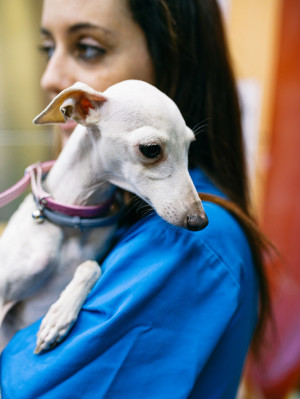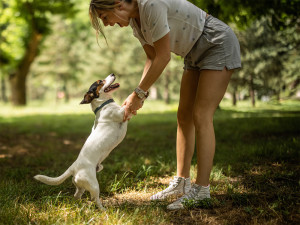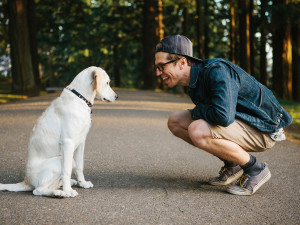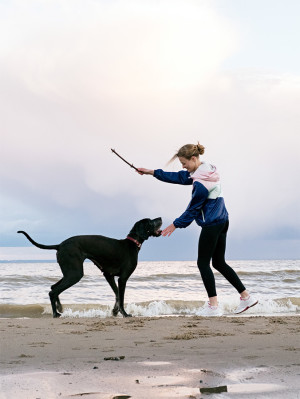Shelters Are Turning Away Dogs Right Now. Here’s Why You Should Foster Them
Rescues and shelters need you to take on foster dogs this winter as a respiratory illness spreads.

Share Article
As if we haven’t dealt with enough mysterious sicknesses over the past few years, there’s now one affecting our pups. A strange and contagious respiratory illness, dubbed canine infectious respiratory disease complex (CIRDC), has been working its way around the country with increasing prevalence lately. The latest reports have cases appearing in at least 16 statesopens in new tab, leading to fear and confusion among pet parents and animal welfare workers. In response, some shelters are beginning to take the Wakanda route by cutting themselves off from outsiders to protect those already under their care.
Sadly, this has led to heartbreaking circumstances, like what happened to a pup named PD. Last week, the San Diego-based animal rescueopens in new tab The Animal Pad received a callopens in new tab about PD, a senior dog who was scheduled to be euthanized. His longtime pet parent had passed away, and due to growing restlessness about CIRDC, local shelters were not accepting new dogs. Because of this and his advanced age, he was determined to be a euthanasia candidate. But the doctor assigned to perform the procedure couldn’t bring himself to do it to a dog who clearly had so much life left in him.
“It just really struck panic through me. I think most pet lovers’ greatest fear is what happens when you cannot be there to be responsible for your pets anymore,” says the organization’s executive director, Lauren Botticelli. Of course, The Animal Pad is not a rescue that’s able to simply look the other way in a situation like this. “Given how great he looked and his condition for being such a senior dog, it was very clear that he had been loved and taken care of for many years. For that to be cut short when there are people out there willing to help would have been such a shame,” she adds.
Botticelli is happy to report that PD has already found a foster, but his journey is indicative of a larger problem now developing. Shelters across the country are growing uneasy at the prospect of welcoming new dogs into their care, and not all pups have an organization like The Animal Pad to save them. While Botticelli understands why some shelters, especially smaller groups, would want to minimize the risk of an in-house outbreak, she fears for the pets being denied housing.
“Where does that leave the animals that still need a place to go?” Botticelli wonders. “And with rescue groups being so short on resources themselves, it’s just a vicious cycle of these animals not having the help they need.”
Why shelters are being so cautious
In fairness, the founder of the Chagrin Falls Veterinary Center and Pet Clinicopens in new tab in Ohio, veterinarian Dr. Carol Osborne explains that avoiding places where dogs congregate is an effective means of halting exposure. “Preventing the spread of these diseases usually involves isolating any suspected dogs,” she says. That being said, The Animal Pad currently has around 400 dogs in their care, many of which were strays. The org also has a separate facility where they initially quarantine newcomers to lower the odds of an outbreak. But they are merely one institution already pushing capacity, and other groups may not have the same space or resources to separate new pups.
Plus, there’s another possible wrinkle to these CIRDC outbreaks that makes the notion of shelters closing their doors even more upsetting. “Infectious respiratory disease cases are at a lull compared to where they had been over the last few years. Stories of a mysterious respiratory illness are inconsistent with what is being seen in practice,” says Dr. Lauren Krone, a veterinarian at the Veterinary Emergency Groupopens in new tab in Newton, Massachusetts.
She notes that these infectious respiratory disease cases are not a cause for alarm but rather reflect the fact that pets have returned to normal activities following the pandemic. Per Dr. Krone, infectious respiratory illness cases in dogs have been widespread since the COVID-19 lockdown ended and people were able to go back to offices. “The simultaneous return of new puppies and older dogs to daycares, boarding facilities, and groomers led to an uptick in respiratory illnesses, similar to the pattern observed in people during the pandemic,” she explains.
The American Veterinary Medical Association (AVMA) seemingly agreesopens in new tab, stating that CIRDC outbreaks occur regularly and most dogs fully recover in a little over a week. AVMA does note that the pathogen responsible for recent cases has yet to be identified; however, only a small percentage of dogs will develop a severe reaction. “Most dogs that face these illnesses do exceptionally well and live normal lives following routine care. Some will have pneumonia and require more extensive care, but they generally do very well,” Dr. Krone states. Still, she fears how potentially inflated reactions are affecting local communities and shelters.
Why it’s crucial to foster a dog right now
Despite questions about the disease’s nationwide severity, animals are still suffering. Shelters are still rejecting new dogs, and with the information we currently have, there is one crucial step that will, no doubt, help in a major way. The need for more fosterers is clearer now than ever. As Botticelli puts it, “It was important before this, and now I feel like it’s just been amplified to the next level…It’s kind of a free-for-all with a lot of different rescues right now, and foster homes are the legit only way that they can say yes to an animal.”
Just as it has for PD, fostering can save a dog’s life in uncertain times. Botticelli specifically points to the holiday season as a perfect time to start fostering. It’s not uncommon for rescues and shelters to lose foster volunteers this time of year because of travel demands, she explains. Besides, it is the season of giving. “There’s something special about the magic that you can feel in your house when you take in an animal that’s just grateful to be there. And I think that the holiday season leads you to want to give more and want to give back more,” Botticelli says. She goes on to state that this year, The Animal Pad is asking for fostering more than adopting or even donations.
Now, if you do decide to foster, there are still a couple of things to consider. For one, thank you for that; you’ve certainly made my personal “nice” list. More importantly, there’s still the threat of your new foster pup contracting CIRDC. Regardless of its intensity, it is still a real risk. Besides, who wants to be sick during the holidays? Fostering will massively protect animals by keeping them out of a crowded kennel, as well as providing them with more exclusive care. But there’s also plenty you can do to protect them further until they find their forever home.
How to keep your foster pup safe from CIRDC
First, it’s important to recognize the initial signs of infection because early treatment is crucial to recovery. Dr. Osborne notes that the earliest symptoms include coughing, sneezing, fever, inconsistent appetite, or occasional lethargy. If any of these are present, you should contact your vet and schedule an appointment immediately. To avoid contact with the disease, Dr. Osborne recommends pausing any trips to dog parks, grooming salons, daycare facilities, or boarding kennels.
Practicing good sanitization around the house is equally advised, as most viruses are easily killed by disinfectants, according to Dr. Osborne. She suggests cleaning crates and any exposed surfaces such as floors, food and water dishes, toys, and bedding regularly.
If a dog is experiencing coughing fits, remove their collar in the home to not further irritate their breathing ability. More than anything, make sure your pup is up to date on their vaccinations, especially for the flu and bordetella.
And if you’re still on the fence about fostering, allow Botticelli to give you her heartbreakingly accurate pitch: “We haven’t had a foster regret it yet, even with the ones that have taken in dogs that would be considered on the ‘naughty’ list. I think that it’s so important, and it helps so much. Sometimes, it’s honestly the difference between life or death.”

Sean Zucker
Sean Zucker is a writer whose work has been featured in Points In Case, The Daily Drunk, Posty, and WellWell. He has an adopted Pit Bull named Banshee whose work has been featured on the kitchen floor and whose behavioral issues rival his own.
Related articles
![man and lab puppy on park road]()
When, Exactly, Should You Vaccinate Your Puppy?
If it’s time for a round of shots (no, not that kind), follow this guide.
![A happy woman is lying on a bed, her dog smelling her face.]()
9 Diseases You Can (and Definitely Can’t) Catch From Your Dog
Here’s what you can scratch off your “Worry About This” list.
![Side view of smiling blonde woman with stick playing with black German Dane pet on beach.]()
Vaccine Hesitancy Reaches the Dog World, Survey Finds
Let’s debunk some things right now for new pet parents with questions.
![Two women and a man in glasses sitting in front of a decorated and brightly lit Christmas tree while the central woman holds a Shiba Inu dog looking directing at the viewer]()
How 6 Orgs Find Joy and Help Adoptable Animals During the Holiday Season
The holiday season is not so jolly for a lot of pet rescues. Here’s how they help their animals — and their volunteers and staff members — this time of year.
![Couple laying on the floor with their kitten during Christmas]()
Should You Give a Pet as a Gift? It Depends
Puppies and kittens are cute, but read this expert advice before attaching a bow to their collars and handing them to a pal.









